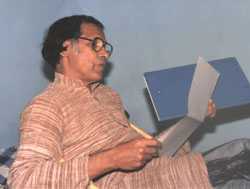Sebastian Kappen

Sebastian Kappen (4 January 1924, Kodikulam, Kerala (India) - 30 November 1993, Bangalore, India), was an Indian Jesuit priest and theologian.
Formation and studies
Born in a traditional family of the Syro-Malabar Catholic Church, Kappen entered the Society of Jesus at the age of 20 (in 1944), and was ordained a priest on 24 March 1957. He pursued studies at the Gregorian University (Rome), obtaining a doctorate in Theology (1961) with a thesis on Religious Alienation and Praxis according to Marx’s Economic and Philosophical Manuscripts of 1844. This was a time when Marxism was growing in influence in his home state of Kerala, in India.
Away from scholasticism, and its essentialism, he found in the Marxian tools of social analysis effective instruments to understand how countless people get alienated from their true freedom and lose their right to contribute to the wellbeing of society.
Evolving thought and action
Henceforth, Freud, Marx and the gospel of Mark became the dialectical poles of Kappen’s thought and life, in view of liberating the human person from hidden oppressive psychological and social forces. Healing and wholeness are found in the person of Jesus, the Son of God.
His theological stances evoked strong criticism in traditional circles of the Church. In 1972 Kappen moved out of Jesuit large institutions and started living among the poor wherever he was posted: in Cochin, and later in Trivandrum, Madras and Bangalore as well. Though attempting regularly to bring him back to regular Jesuit community life, his superiors were understanding enough to let him adopt a life-style more conducive to his creative writing. His locus theologicus had necessarily to be the people, and particularly the poor.
His studies were geared towards transformative social action in India. This led him to an investigation into the liberative and humanizing potential of the original teachings of the historical Jesus (hence his preference for the Gospel of Mark) as well as of Indian traditions, particularly the tradition of religious dissent represented by the Buddha and the medieval Bhakti Movement. He has written and lectured extensively on the cultural restructuring of Indian society.
Ever critical of systems, structures and institutions, Kappen’s search was leading him beyond denominational and religious affiliations or political ideology. No political, religious or economic system was absolute: they are all to be valued in the measure they serve the people. He was not to be prisoner of a party and its ideology, not even of a religious one. His yardstick was the freedom of the living God of Jesus; that was also his faith and spirituality.
As could be expected the stand he took for more responsible freedom and less institutional conventionality in Church and society brought him in conflict with the catholic hierarchy.
In 1977, he published Jesus and Freedom, with an introduction by the Belgian priest and professor at the Louvain University François Houtart. The book came under official Church scrutiny. Kappen responded with a pamphlet entitled Censorship and the Future of Asian Theology. He wrote:“I write with responsibility. There can be defects or errors in my work. I am not infallible. Responsible thinkers and scholars the world over could judge and sift my work. In public discussions we can help each other and learn from one another. That is how truth grows in history: through a social process, and not through secret censorship”.No further action was taken by Church authorities on this matter.
Kappen had been visiting professor to the Pontifical Faculty of Theology (Pune), Vidyajyoti College of Theology (Delhi), The Catholic University of Louvain (Belgium) and Maryknoll Seminary (New York).
From the late 1980s he started having heart problems. He stopped smoking. He had also to slow down his intellectual pursuits. He was particularly incensed by the senseless bombing of Iraq’s people during the gulf war of 1990-1991: a reaction typical of a man often genuinely angry at the sight of injustices committed against innocent civilians. This brought about, according to some, the serious heart crisis that ultimately led to the attack that carried him away on 30 November 1993. Kappen died in Bangalore, but his body was brought back to Kozhikode where he is buried.
Writings in English
- Jesus and Freedom, Orbis Books, New York, 1977.
- Marxian Atheism, 1983.
- Jesus and Cultural Revolution; an Asian Perspective, 1983.
- Liberation Theology and Marxism, 1986.
- The Future of Socialism and Socialism of the Future, Bangalore, 1992.
Writings in Malayalam
- Vswäsathilninnu Viplavathilèkku (From Faith to Revolution),1972.
- Marxian Darsśnathinu Orämukham (An Introduction to the Philosophy of Marx), 1989
- Pravachanam Prathisamskruthi (Prophecy and Counterculture),1992.
- Akraistavanäya Yèśuviné Thèdi (In Search of the Non-Christian Jesus), 1999 (posthumous).
Posthumous publications
- Tradition Modernity Counterculture, 1994.
- Hindutva and Indian Religious Traditions, 2000.
- Divine Challenge and Human Response, 2001.
- Jesus and Society, ISPCK, Delhi, 2002.
- Jesus and Culture, ISPCK, Delhi, 2002.
- Towards a Holistic Cultural Paradigm, 2003.
Bibliography
in English
- Philip Mathew and Ajit Murickan (ed), Religion, Ideology and counterculture; Essays in honour of S.Kappen, Bangalore, 1987.
in Malayalam
- Prathi-samskruthiyilekku (Counterculture Thoughts of Fr. Sebastian Kappen), Manusham Publications, Ettumanoor, 2008.
External links
|